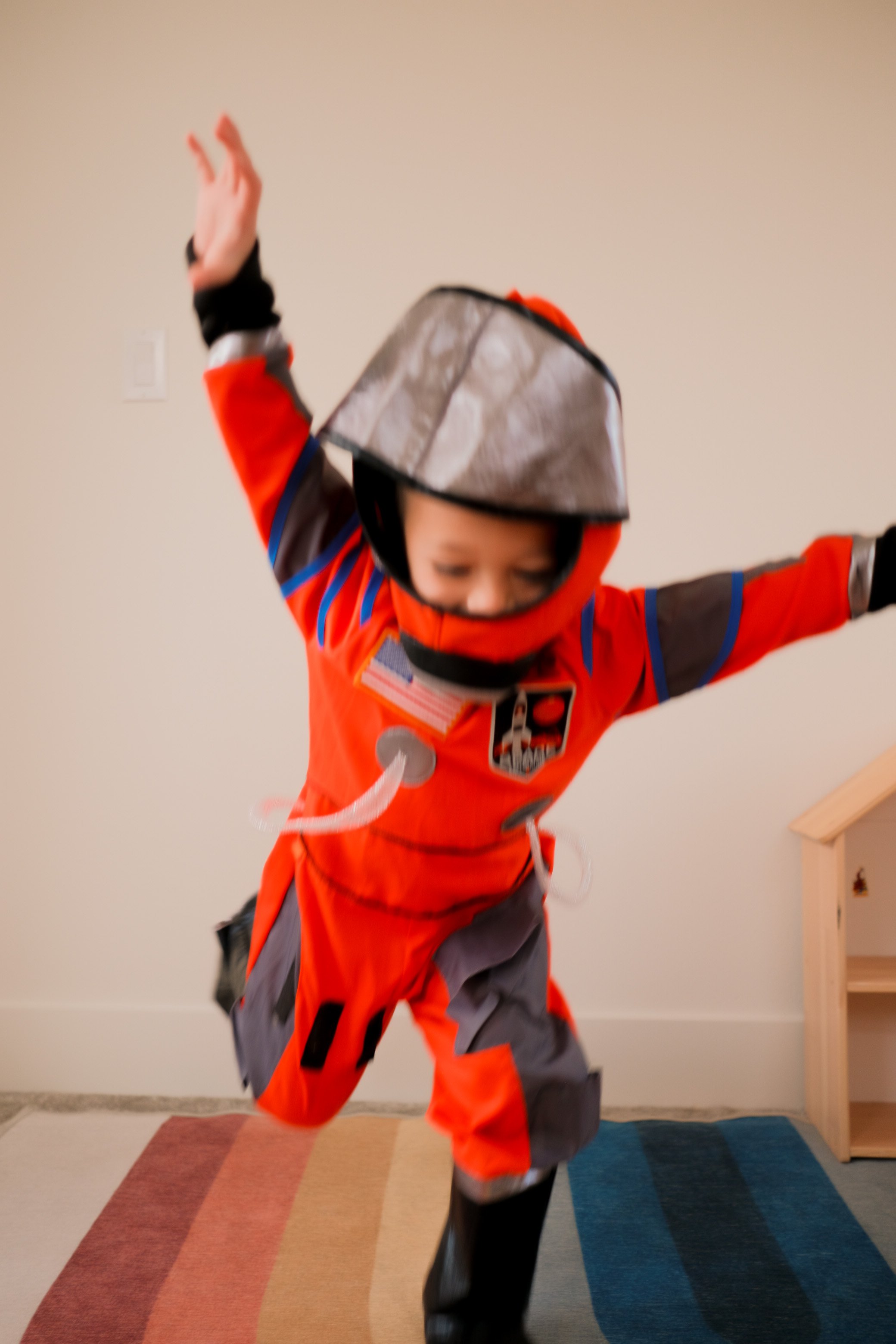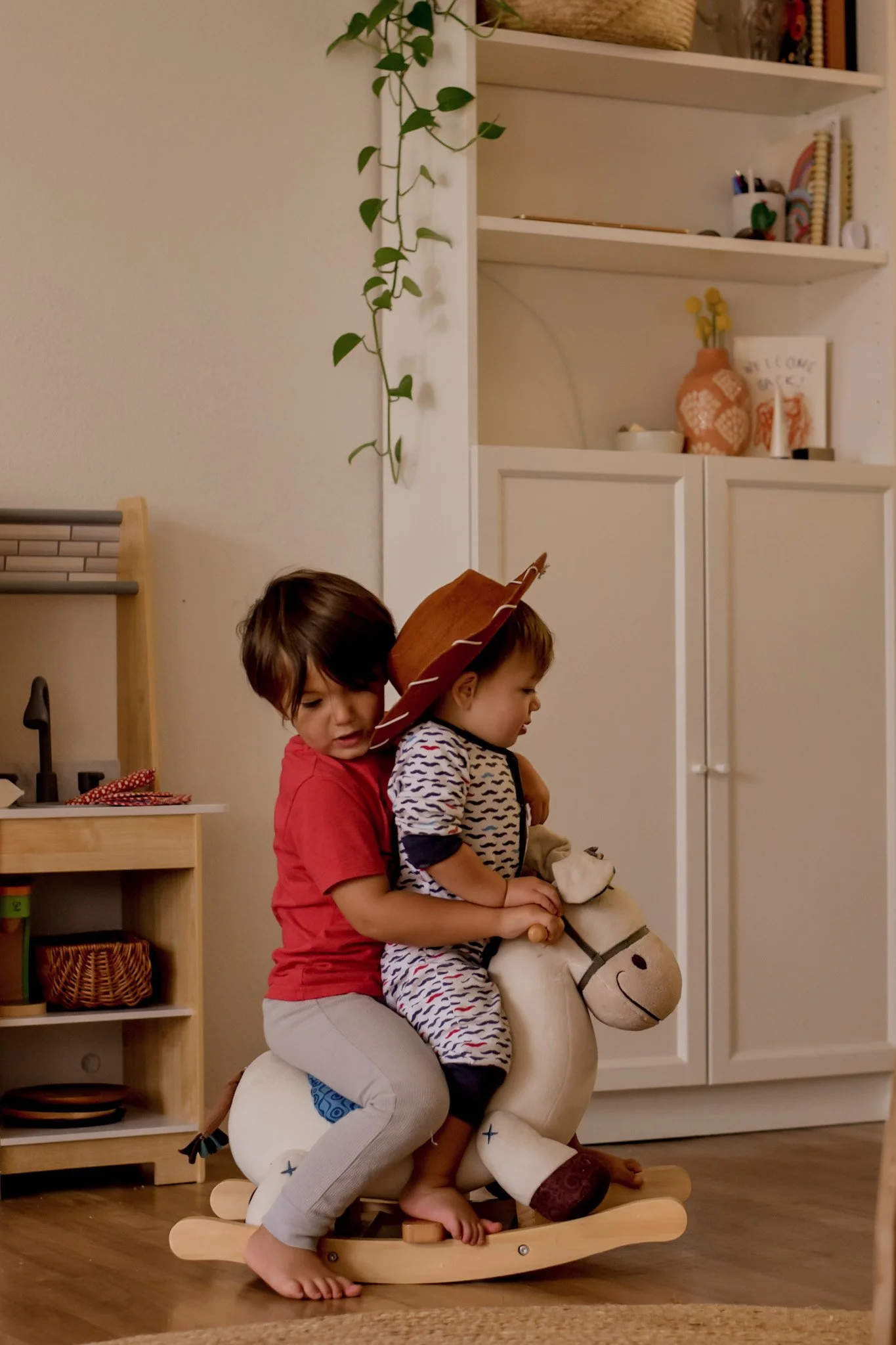Learn How to Replace Screen-Time with Free Play
The TV Detox
Aren’t you tired? Tired of cooking and cleaning and paying bills and folding laundry and working from home, all while doing your very best to keep your little one happy, entertained, and busy?
You’re overwhelmed. You’re literally juggling all the things. You know you’re supposed to limit screen-time, but you feel like you may actually lose your mind without it. When they aren’t on their tablet or watching TV, they’re whining, clinging, fighting, begging you to play with them, and grating on your every nerve.
You feel exhausted and done, almost every single day.
Your child has endless toys, even some fairly pricey ones, and they still won’t play independently. They just always need you to be there. To play. To entertain. To keep them busy. When you don’t have time to play, you’re met with the mother of all meltdowns. It must just be their temperament, or maybe their age… right?
Screens are the only thing that seem to regulate your child - the only thing that keeps them calm and content. What could possibly be the harm in that? You get a break from the meltdowns, they get to do something they enjoy. It seems like the ultimate win-win.
Screen-time feels like your only saving grace… but, what if the opposite is true? What if screens are actually causing the clinginess and the whininess, the relentless meltdowns and the lack of play? What if?
Constant tantrums and meltdowns, nightly bed-time battles, a house full of untouched toys
“Independent” play?
Yea, right
But you’re wondering: what does any of this have to do with screen-time?
Well, what we’re learning is that screens affect the developing brain in a number of ways. When your child engages with a screen, their brain floods with dopamine, blood flow to their frontal lobe decreases, and their brain activates a stress response.
What may look like regulation is actually sedation.
After screen-time, your child’s dopamine levels drop dramatically, their ability to access their frontal lobe skills (problem-solving, impulse control, creativity, attention, mood-regulation, etc.) become almost non-existent, and they remain in fight-or-flight mode due to stress hormones.

“Long before addiction sets in, a child's sensitive nervous system can become overstimulated and hyperaroused from moderate but regular amounts of screen time. This causes the brain to be in a state of chronic stress and effectively short circuits the frontal lobe, creating a host of symptoms that mimic or exacerbate mental health, learning, and behavioral disorders.”
- Dr. Victoria Dunckley
In the short term, screen-time makes it difficult for children (and grown-ups) to sleep, play, relax, learn, listen, focus, control impulses, and regulate emotions.
In the long term, hormonal imbalances, chronic stress, and a lack of play disrupt early brain development, severely limiting a child’s chances of entering adulthood with a fully functioning brain.
The TV Detox will teach you how to help your child’s brain heal and reset, so you can break the vicious cycle of screens and meltdowns —
without having to replace screen-time with yourself.
Learn How To:
Break (or prevent) your child’s addiction to overstimulating screen-time.
Discover your child’s ‘baseline’: their true personality when unaffected by screens.
Declutter toys and prioritize high-quality, budget-friendly play materials.
Create a toy storage and rotation system to minimize mess and increase play.
Welcome boredom and officially stop relying on screens.

Free 7-Day Course
-
Everything you need to know about the effects of screen-time on the developing brain, tech addictions, and overstimulation.
-
Discover the key elements of quality screen-time.
-
Learn which lifestyle changes you may need to make for optimal results.
-
Learn how to declutter toys and prioritize high-quality play materials.
-
Learn how to create an engaging play space, establish a doable toy rotation system, and support independent play.
-
Choose the detox journey that is right for your family and learn how to discover your child’s natural temperament - who are they when unaffected by screens?
-
Begin your journey of helping your child’s brain heal and reset, and watch their behavior transform.
Start replacing screens with play.
Jerrica’s Story
With over a decade of experience working with families and multiple child development degrees, I genuinely thought I had this motherhood thing in the bag… but I very quickly realized that was not the case.
In school, we talk about the big picture stuff - about what children need in theory, according to science and research.
What we don’t learn is the day-to-day of parenthood. How to be present, but also keep the house clean. How to connect, while still feeling like an adult. How to stay sane, while spending all day every day with small humans who have millions of demands and expectations and feelings.
Like most parents, I quickly turned to TV for a mental break, especially while I was pregnant with my second child. I knew screen-time should be avoided, but I honestly just didn’t see anything convincing enough to make me give it up.
It wasn’t until a year and a half later (when my oldest was almost 3) that I really began noticing how much TV affected his behavior. I really struggled to connect with him at times. He would scream and run around the house, especially at bed time, and if we tried to stop him, it was as if a mysterious force had taken over his body. He couldn’t make eye contact with us, we couldn’t reason with him… it was like he just couldn’t hear us, and I didn’t know what to do.
After digging into the research, I began adjusting our screen-time habits and he basically became a completely different child. His challenging behaviors essentially disappeared and our days became much more peaceful, with minimal effort on my end.
I remember how heartbroken and angry I was with myself when I realized how much our TV habit had set my child up for failure, but now — 4 years later — I’m just grateful beyond grateful for the information that allowed my little boy to thrive.
This is your chance to discover your child’s true temperament, personality, and abilities.
Trust me, it’s well worth the experiment.





